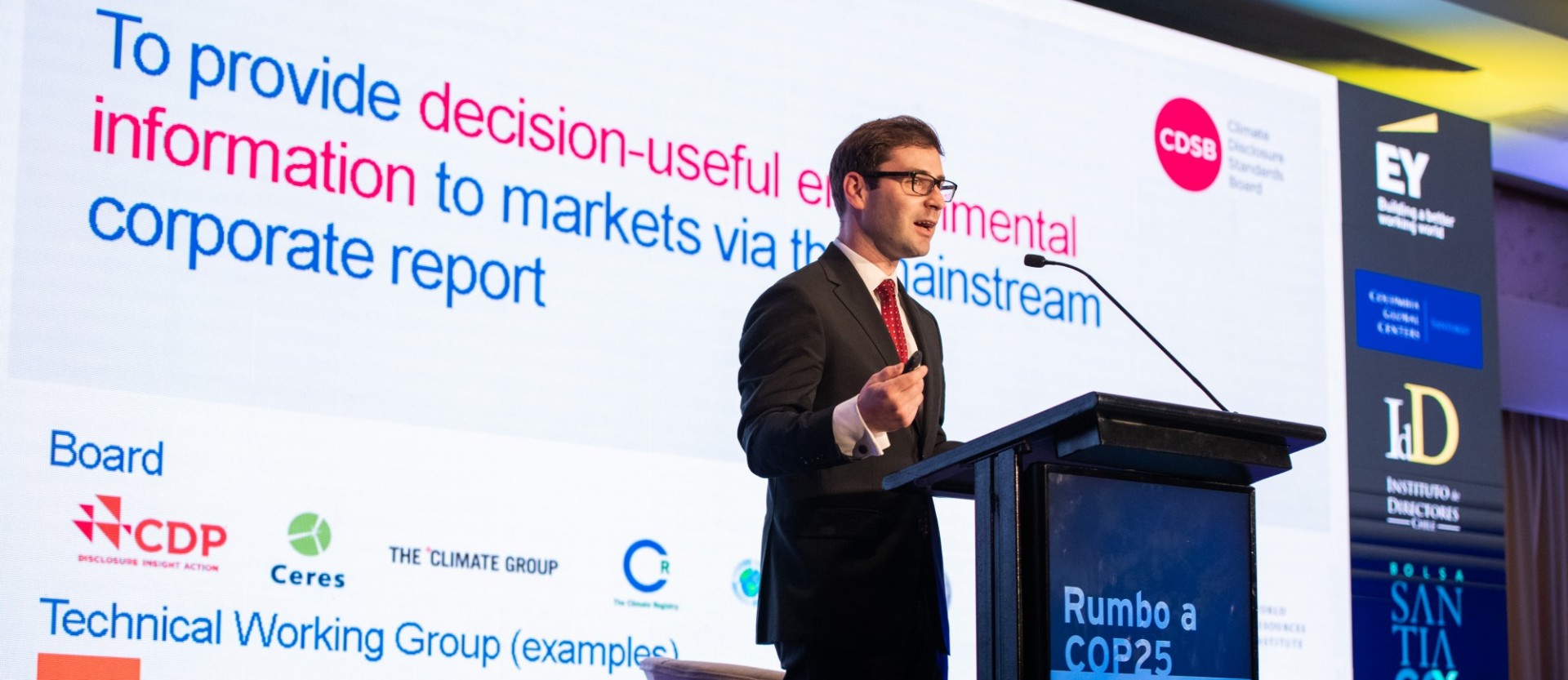Experts, Execs Weigh in on Climate-Related Financial Disclosure

Using a market-based approach to consider what impact climate change has on business includes risks but also opens up a world of opportunities, according to Michael Zimonyi, Policy & External Affairs Director at the Climate Disclosure Standards Board (CDSB), an international consortium of business and environmental NGOs that offers companies a framework for reporting environmental information with the same rigor as financial information.
In fact, while insurance companies had to disburse US$135 billion in 2017 alone to respond to climate-related disasters, there were another US$195 billion in losses that were uninsured, according to Héctor Lehuedé, partner of corporate governance consulting firm Razor Consulting. However there is a US$2.1 trillion opportunity in new business that addresses climate change, such as low-emission products and services, recycling, new means of production and more capital being made available for those companies that are considered clean entities. At the same time, most boards are “blind” to the reality of climate change and need to assume more responsibility, he said.
Both experts were presenting at the conference “Rumbo a COP25: Cómo Enfrentar el Riesgo Climático desde el Directorio” (Path to COP25: How to Address Climate Risk from the Board of Directors), sponsored by EY and Columbia Global Centers | Santiago, with the support of the Santiago Stock Exchange.
The seminar was opened by EY Chile President Cristián Lefevre, who noted that within the framework of the COP25 climate change global conference set to take place in Santiago at the beginning of December, Chile has the unique opportunity to set and be an example of change for the rest of the world. From a business perspective, the role of corporate governance is key for companies to define and implement a solid mitigation plan.
The presentations were followed by a panel discussion regarding the board’s role in facing and mitigating climate change, with the participation of Valter Moro, General Manager of energy conglomerate company Enel, Karen Poniachik, Santiago Center Director and board member of different companies; Arturo Tagle, President of BancoEstado; Francisco Ulloa, Managing Director for West Coast South America at logistics and shipping firm Maersk; and Elanne Almeida, Partner for Advisory Services at EY.
During the panel, the Santiago Center’s Poniachik said that legal and reputational risk is directly related to climate change-related risk. She called on companies’ boards to make environmental issues part of the corporate structure when it comes to impact on finances, installations and workers; to implement KPIs relating to operational resiliency; and to make full disclosure regarding ESG risks. She discussed best practices with respect to climate governance on corporate boards, including having climate-knowledgeable professionals forming part of the board, assessing material risk and opportunity, and aligning executive incentives to promote the company’s long-term prosperity (which may include climate-related targets and indicators).
In turn, BancoEstado’s Tagle acknowledged that Chile still has much to develop regarding environmental issues but he highlighted the bank’s measuring its carbon footprint and its implementation of energy efficiency programs. Maersk’s Ulloa said that climate issues cannot wait any longer and he pointed to the Denmark-based shipping company’s goal to have 0% emissions by 2050. “Over 90% of the goods in the world market are shipped. We need to decarbonize the logistics chain, but we can’t do that alone,” he said, calling for an industry, top-down effort to look for alternate power and fuel sources.
To close the event, Joaquín Cortez Huerta, President of Chile’s Financial Markets Commission (CMF) announced that the commission is in the final stages of a “very relevant project” to modify and improve information requirements in social responsibility and sustainable development matters, wherein listed entities must include ESG aspects, including environmental issues, in their annual reports.
To see the Pictures Gallery click here.